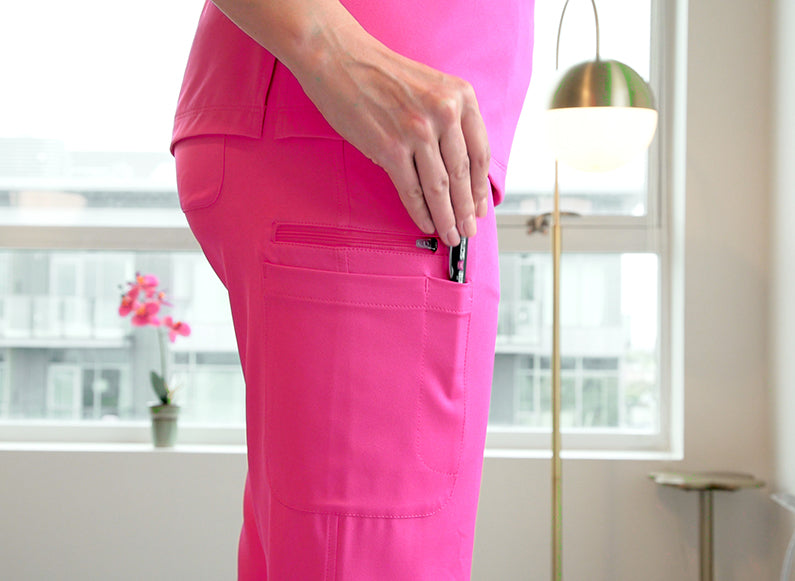Written by Lizzette Cruz, RN, MS
Take a minute to think about your typical work day:
Do you prioritize time to disconnect and take a restful break?
Or, do you tend to cut breaks short or skip them altogether, prioritizing patient responsibilities over yourself?
If you are one of those hard working Moxie nurses who skips breaks, you’re not alone. More than 50% of nurses report taking no breaks at all, according to a recent study.
But, no matter how difficult it seems while on shift, taking your well-deserved break has major benefits for both you AND your patients. Learn how to shift (get it?) the habit. We guarantee it's worth it!
Why is it so difficult for nurses to take breaks?
The culture of skipping breaks isn’t limited to hospitals- nurses in physician offices, home health providers, and administrative roles (who may not even wear medical scrubs to work!) also fall into the habit of working through their breaks. Let’s dive into why.
Physical Factors: Demanding workloads, unexpected emergent situations, and insufficient staffing on nursing units all contribute to taking fewer breaks.
Unit Culture: Prioritizing breaks is especially challenging when unit culture historically skips them.
Different Generations, Different Perspectives: Studies reveal generational differences in the nursing workforce. Older nurses are more likely to skip breaks. Younger nurses prioritize work-life balance, and are therefore more likely to take breaks.
Skipping Breaks has Heavy Health Risks
Don’t underestimate the value of a break and what it can do for you in the long-term. Research shows that working long hours with insufficient breaks can lead to an increase in risk for health problems such as:
-
heart disease
-
fatigue
-
depression
-
burnout
On the other hand, taking regular breaks can:
-
lower stress
-
increase your energy levels the day of and over time
-
improve your performance
-
increase job satisfaction
-
create better cognition and clearer thinking
-
improve patient care and health outcomes
There’s Proof.
A recent initiative by Massachusetts General Hospital showed that providing nurses with an hour-long, off-site meal break resulted in refreshed, energized, alert nurses who demonstrated improved time management.
The initiative was a major cultural adjustment - none of the staff were accustomed to leaving the unit during their shifts. In addition to better patient care, the change increased active engagement between colleagues on the unit, improving morale overall.
Here’s How:
1. Have an extra moment? Take your break early!
You never know what will be happening on the unit at your allotted break time. Instead of hoping there won’t be an emergency later, take your break early! You’ll be refreshed and sharp ahead of non-negotiable tasks.
2. Be honest with yourself.
When you ask yourself, “Do I need a break?” answer honestly. If you’re like most nurses, you are a pro at pushing through. But, if you really listen to your body, there’s a good chance your feet wouldn’t mind a rest.
3. Empower your colleagues.
If you notice a colleague looks tired or overwhelmed, let them know it’s ok to step out for a moment to refresh and recenter themselves. Showing your colleagues that breaks are not only ok but encouraged will create a ripple effect through your unit that slowly melts away the shame and guilt that saturates so much of nurse culture. This is especially effective for nurses in leadership roles.
4. Embrace Mini-Breaks.
Sometimes, a full break is just not realistic. However, even 15 seconds of centering yourself between tasks can do wonders for your resilience and mental clarity. Here are 3 Quick Things Nurses Can Do When You’re Too Stressed to Take a Break.
Changing nursing culture doesn’t happen overnight. It takes tenacity… some might even call it Moxie! Just as it is our duty to care for our patients, we also have a duty to care for ourselves. Start by acknowledging the need for change, and follow through. This is the time to advocate for yourself.
Catherine Pants

$39.99
DESCRIPTION The Catherine Scrub Pants are the must-have item in your selection of comfortable and professional workwear. At Moxie, we have taken the classic straight leg scrubs pant style and upgraded it to a whole new level. Our 4-Way Stretch,… read more
Catherine Pants

$39.99
DESCRIPTION The Catherine Scrub Pants are the must-have item in your selection of comfortable and professional workwear. At Moxie, we have taken the classic straight leg scrubs pant style and upgraded it to a whole new level. Our 4-Way Stretch,… read more
About the Author:
Lizzette Cruz, RN, MS is a registered nurse with over 8 years of cardiovascular and research experience with a background in Physiology. Lizzette’s interests include health, wellness, disease prevention and writing.
References:
-
Hendricks JM, Cope VC. Generational diversity: what nurse managers need to know. J Adv Nurs. 2013 Mar;69(3):717-25. doi: 10.1111/j.1365-2648.2012.06079.x. Epub 2012 Jul 9. PMID: 22775766.
-
Park S, Lee JH, Lee W. The Effects of Workplace Rest Breaks on Health Problems Related to Long Working Hours and Shift Work among Male Apartment Janitors in Korea. Saf Health Work. 2019 Dec;10(4):512-517. doi: 10.1016/j.shaw.2019.10.003. Epub 2019 Nov 6. PMID: 31890334; PMCID: PMC6933219.
-
Nejati A, Shepley M, Rodiek S. A Review of Design and Policy Interventions to Promote Nurses’ Restorative Breaks in Health Care Workplaces. Workplace Health & Safety. 2016;64(2):70-77. doi:10.1177/2165079915612097
-
Nejati A, Rodiek S, Shepley M. The implications of high-quality staff break areas for nurses' health, performance, job satisfaction and retention. J Nurs Manag. 2016 May;24(4):512-23. doi: 10.1111/jonm.12351. Epub 2015 Dec 15. PMID: 26667389.





